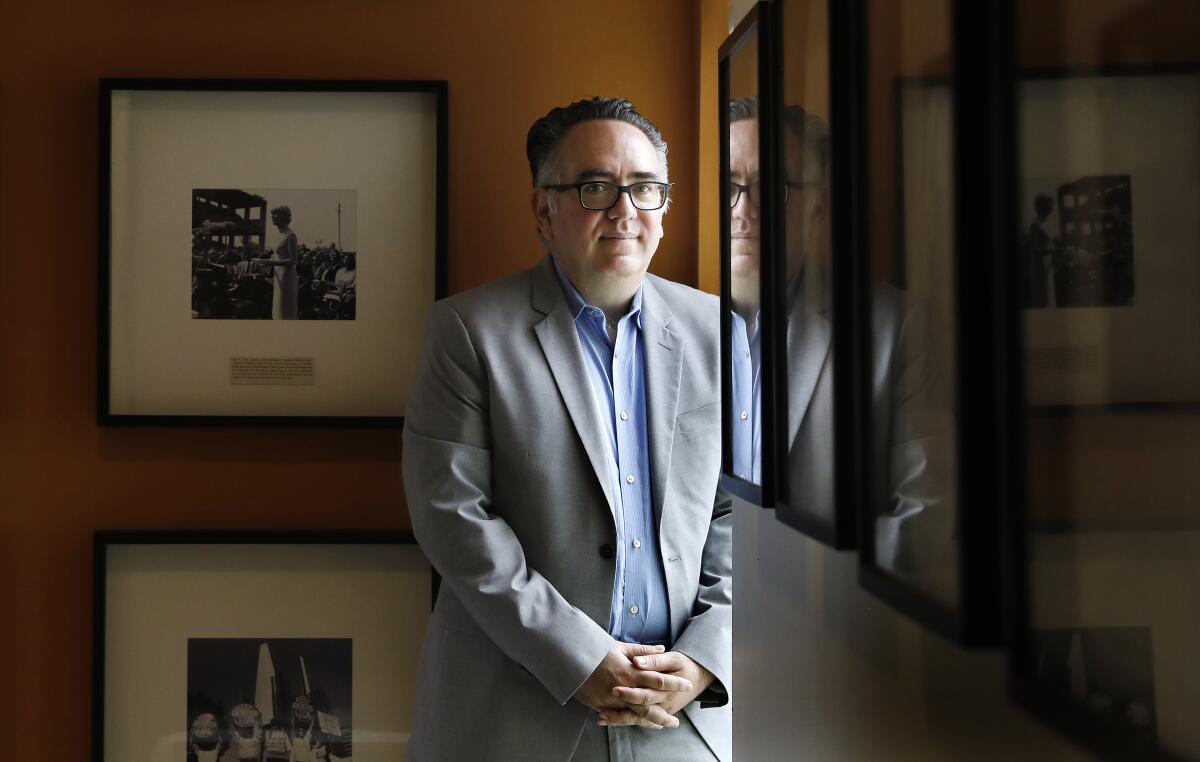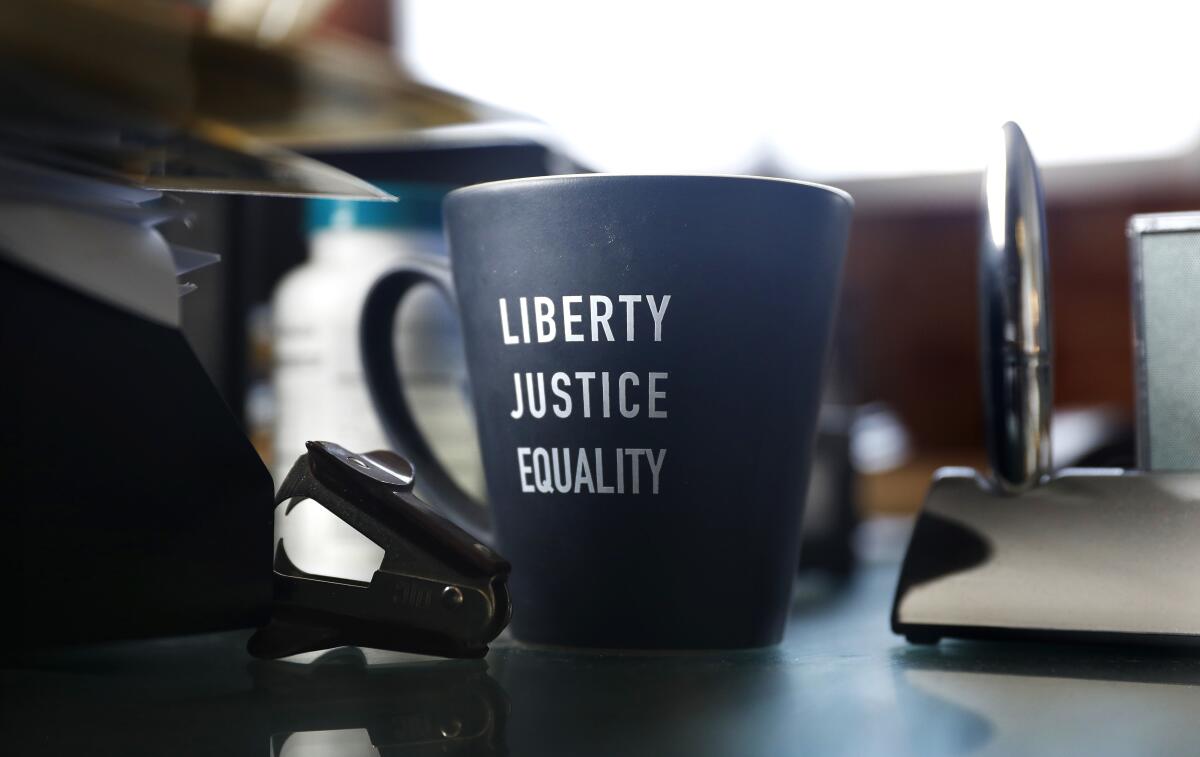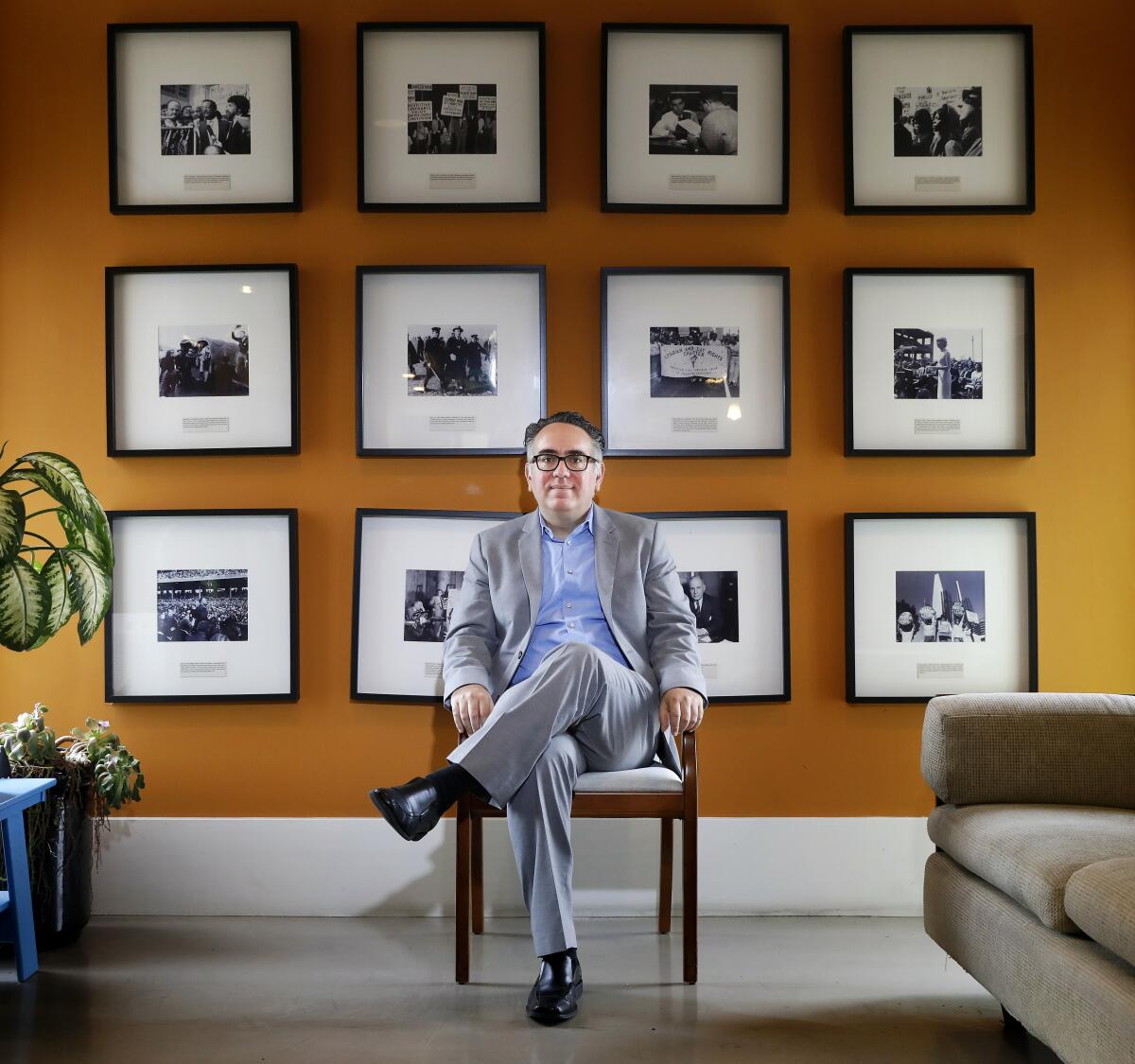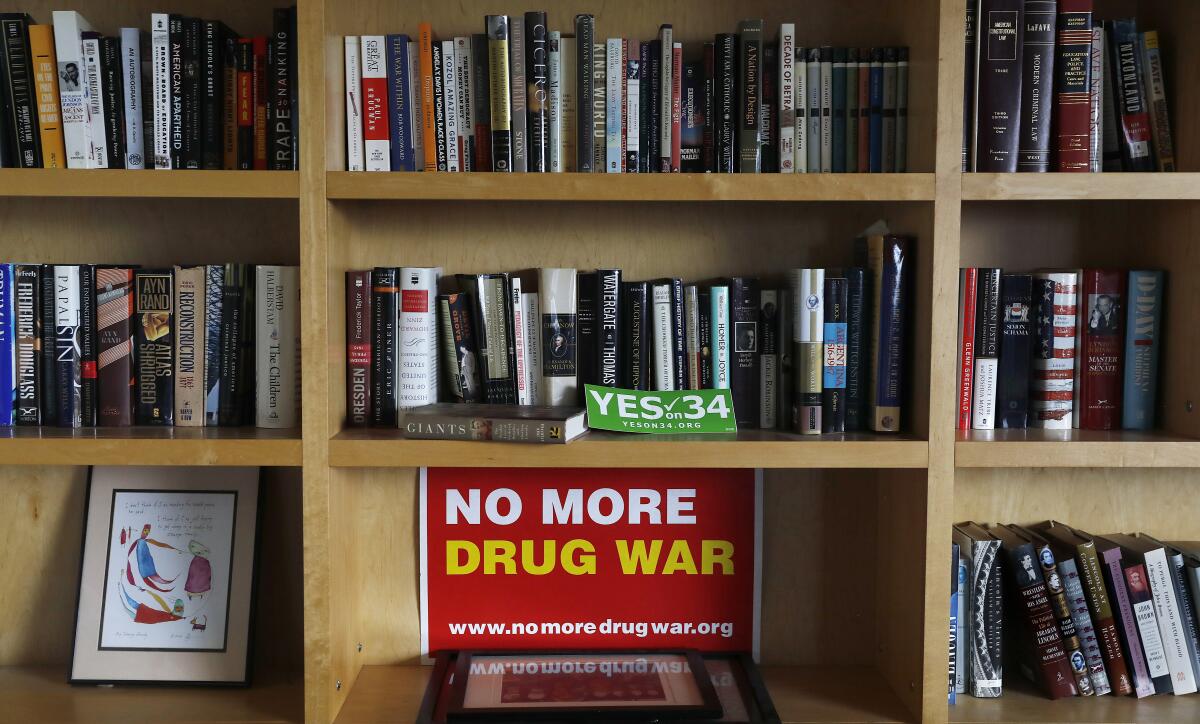From drag queens to inmates: The ACLU’s battle for civil liberties in Southern California

- Share via
Sir Lady Java wore feathers and danced in Los Angeles nightclubs a half-century ago. A transgender woman, known then as a female impersonator, she was of her time but also very much ahead of it, a performer whose battles and brash glamour resonate today as drag queens and LGBTQ+ rights are under siege across the nation.
A hat maker and designer, Sir Lady Java, who arrived in a blaze amid the counterculture, saw her act threatened in 1967 by a city regulation that prohibited performers from cross-dressing in clubs, except by permit. Hers was denied. The American Civil Liberties Union took her case to the California Supreme Court. She lost, but the ordinance was revoked two years later.
Now known as Lady Java, the 79-year-old is revered as an early activist in the LGBTQ+ community. Her story is tucked into the files of the ACLU of Southern California, which opened in 1923 after muckraking writer Upton Sinclair was jailed for reading the 1st Amendment while supporting protesting San Pedro dockworkers.

Since then, the organization, which is often criticized by conservatives, has represented civil liberties cases involving immigration, voting rights, freedom of speech, jail reform, police abuse, education equality, racism, homelessness, religion and the mass incarceration of Japanese Americans during World War II. The ACLU’s national office has been at the forefront of seminal moments in American history, including Brown vs. the Board of Education and Roe vs. Wade.
But when you scroll through the ACLU archives, it’s apparent how legal victories in one era can be undone or threatened years later in a country whose citizens are often at odds over the meaning of its Constitution. The U.S. Supreme Court has overturned abortion rights and is expected in coming days to weaken or abolish affirmative action.
“The Lady Java case is very similar to the drag queen issue of today,” said Hector Villagra, executive director of the ACLU of Southern California. “It’s that same kind of bias against a vulnerable group. It speaks to something that is almost a motto in the ACLU — that no victory ever stays won.”
Critics say the organization has become less zealous in its traditional mission of protecting the 1st Amendment as it rallies to progressive causes around race and gender. But the ACLU says that protections across society — including free speech — need to be guarded when civil liberties are in jeopardy on multiple fronts.
“Every generation has to fight to preserve what prior generations were able to secure,” said Villagra, 55, who went into public interest law after he graduated from Columbia Law School. “Progress isn’t inevitable.”
::
Accelerating political attacks and restrictions on LGBTQ+ rights in “many states are terrifying,” said Amanda Goad, director of the LGBTQ, Gender & Reproductive Justice Project at the ACLU of Southern California.
Nearly 500 bills to limit LGBTQ+ rights and gender-affirming care have been introduced in state legislatures. Even in liberal California, the ACLU has defended transgender clients against discrimination. It joined a 2018 lawsuit on behalf of Christynne Wood, a transgender woman who was denied access to women’s locker rooms at Crunch Fitness gym in El Cajon.
“We start out with a different [political] climate,” Goad said of California, “but we are not immune” to prejudice and discrimination around gender.
Other issues also play like recurring themes in the national conversation. In 1957, the ACLU of Southern California won an injunction against the Beverly Hills police, who had ordered the removal from a shop window of nude replica statues, including Michelangelo’s masterpiece, “David,” for being lewd and obscene. A similar controversy arose this year when a Florida charter school principal resigned under pressure for not informing parents of sixth-graders that a class would be showing a picture of “David.”

“The same battles get re-litigated,” said Villagra, the son of a Cuban refugee and an Argentinian-born sheet metal worker who grew up in Rosemead and Monterey Park. “We’re seeing this across the country.”
Lawyers for the ACLU of Southern California have argued before the U.S. Supreme Court — and in less venerable places. In 1934, A.L. Wirin was kidnapped, roughed up and had his shoes stolen by vigilantes while fighting for farmworkers’ rights in Imperial County. A Russian immigrant and a Harvard University graduate, Wirin worked for the ACLU here for nearly 40 years, representing Japanese Americans during World War II and defending Communists during hearings held by Sen. Joseph McCarthy in the 1950s.
Today, the Southern California office, with a budget of about $20 million drawn from members and donations, has 29 staff lawyers working with legal and policy advocates. Its territory includes Los Angeles, Riverside, San Bernardino and Kern County. About one-third of its workload — the office takes only 1% of 10,000 requests a year — centers on police accountability and the criminal justice system, including a long battle to improve overcrowding and abysmal conditions in Los Angeles County jails.
Fear of crime and lack of empathy for inmates, said Villagra, have limited public outcry for deep reforms — and the cases keep coming.
“Progressives and liberals often become very moderate or even conservative when it comes to police accountability,” said Villagra, whose office successfully sued the city and county in 2020 to repeal curfews set up to limit Black Lives Matter protests. He added that police lobbies and unions have a “level of resistance that’s off the charts” regarding reforms on the use of force. “They’re going to keep fighting and chipping away to resist accountability.”
In 2021, the California attorney general’s office called for comprehensive reforms in the Bakersfield Police Department after an independent investigation and years of accusations of excessive force and other violations. An ACLU report found that when compared with cities with similar crime rates or higher, Bakersfield ranked second highest in California and ninth in the country for its rate of police killings.
Through lawsuits and other measures, the ACLU has pressed for nearly five decades to force the Los Angeles County Sheriff’s Department to stem appalling jail conditions. In February, the ACLU asked a federal judge to hold the county, Sheriff Robert Luna and the county Board of Supervisors in contempt for disregarding court orders to stop inhumane practices, including holding people in cells covered with trash and feces.
The county and the ACLU reached a proposed settlement last week to improve conditions, including limiting how long detainees can be handcuffed to chairs and benches at the inmate reception center in downtown LA.
The organization has had notable successes around improving jail and inmate conditions. A 2014 report by the ACLU and the Bazelon Center for Mental Health Law helped lead to the creation of the county’s Office of Diversion and Reentry. The office transfers people with mental health problems — about 40% of the county jail population — out of jails and into supportive care facilities.
“The jails are a disgrace. People with mental illness shouldn’t be there,” said Peter Eliasberg, a lawyer in the Southern California ACLU office since 1996, who worked on the report and noted that progress often comes in increments. “I started off with an unrealistic idea of how much change I could help engender. You learn your limitations. But still I believe the work I have done with my colleagues has made a difference.”

One of the ACLU of Southern California’s swiftest wins was reversing former President Trump’s Muslim ban in early 2017. Ali Vayeghan was traveling from Tehran to Los Angeles to visit his brother and son. He had a visa to enter the U.S. but was held at Los Angeles International Airport and was not allowed to see his family. Authorities put him on a flight back to Iran the next day. The ACLU and immigration attorney Stacy Tolchin won an emergency court order allowing him to return to the U.S
“When he arrived, people were singing, ‘This Land Is Your Land,’ ” said Villagra, who was at the airport. “Those moments were powerful, and they left an indelible imprint on folks that this is an organization willing and ready to jump into the fray. Not afraid and not apologetic. This is who we are.”
::
Critics say the ACLU is moving in the wrong direction. Jeremy B. Rosen, a prominent Los Angeles appellate lawyer and member of the conservative Federalist Society, said he once admired the ACLU for taking on cases like that of teenager Yetta Stromberg. She was arrested in 1929 for flying a red flag — suggesting communist sympathies — at a summer camp near San Bernardino. In a landmark decision, the Supreme Court struck down the flag law as “repugnant” to the guarantee of liberty.
Rosen said the ACLU’s attention to progressive causes has swept it into the fight for cultural supremacy that is polarizing the country.
“The change they have gone through is not a positive one,” said Rosen, noting that in the 1970s the ACLU defended the 1st Amendment rights of neo-Nazis to march in Illinois. He questioned whether the ACLU would take a similar stand today. “The country doesn’t need another progressive interest group. What we need are organizations dedicated to bipartisan protection of civil liberties. That’s what the ACLU used to be.”
For many on the right, the ACLU has long been regarded as an anti-government provocateur, a Fox News dog whistle to rouse the conservative base. Executive director of the Southern California office since 2011, Villagra, whose combed-back black hair is graying at the temples, said he once gave his wife, who works in Los Angeles County government, an ACLU mug. One of her co-workers “complained about her having communist propaganda.”
He recalled similar sentiment when he headed the ACLU’s Orange County office and protesters turned up: “It was so absurd. One protester had a sign saying that Hitler loved the ACLU and another had a sign that Stalin loved the ACLU, and I thought, wow, look at the ACLU bringing together these disparate forces for the common hatred of us.”
Villagra said his moral sensibilities were shaped by the “Jesuit education I received at Loyola High School. The ideal was “a man for others.”
“The greatest thing you could do was to be in service to others. They almost taught us to question everything.”
But much of the inspiration for his work came from his mother. Her parents supported Fidel Castro and, according to family lore, trafficked guns to his communist revolution in Cuba in the 1950s. But they became disillusioned and sent their children to the U.S., where his mother would later marry an Argentine immigrant with a third-grade education. Villagra said his family faced discrimination —– “the underside of the American story was ingrained in me” — but remembers his mother’s determination to vote in her first presidential election in 1976.
“I have that strong thread from my mom,” he said. “Civil liberties. Freedom of speech. Conscience. Dissent. Those were sacred to her.”
More to Read
Sign up for Essential California
The most important California stories and recommendations in your inbox every morning.
You may occasionally receive promotional content from the Los Angeles Times.











